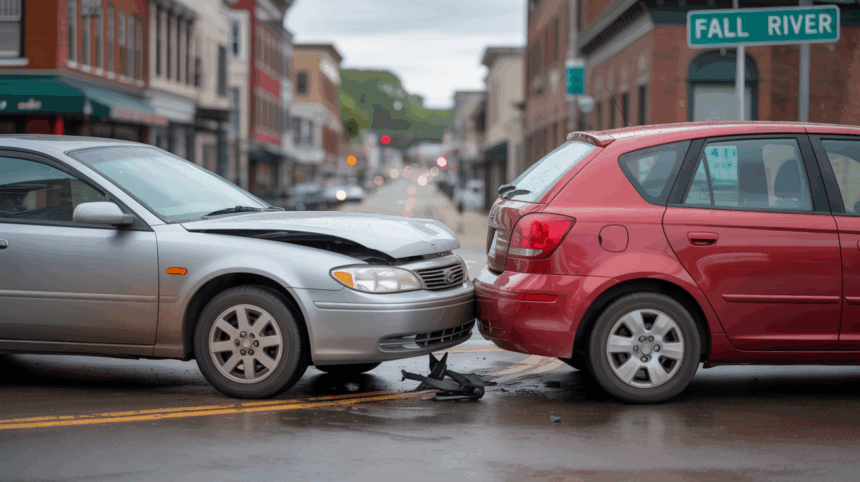We understand that Massachusetts car accident laws can feel intricate, but Jason Stone Injury Lawyers are here to guide you through fault determination, the no-fault insurance system, and vital deadlines.
Acting promptly and gathering strong evidence is essential to protecting your rights and ensuring fair compensation. Whether you’re managing insurance claims or facing disputes, having knowledgeable support matters.
Stick with us, and you’ll gain clear insights on every important step to take after an accident.
For expert assistance, consider reaching out to our Car Accident Lawyer in Fall River.
Key Takeaways
- Massachusetts enforces a no-fault insurance system that covers medical expenses regardless of fault, but there are limits on compensation for pain and suffering.
- Determining fault relies on police reports, witness statements, and evidence, utilizing comparative negligence to assign responsibility percentages.
- Immediate steps following an accident include documenting the scene, exchanging information, and preserving evidence for insurance and legal claims.
- It’s crucial to file claims within the three-year statute of limitations to protect legal rights and maximize compensation.
Overview of Massachusetts Car Accident Laws
Although navigating car accident laws can feel overwhelming, understanding Massachusetts’ specific regulations is vital for protecting ourselves and others on the road.
We must recognize that the state mandates certain insurance policies to ensure financial responsibility after an accident. This includes mandatory liability coverage and personal injury protection, which help cover damages and medical expenses. Additionally, vehicle safety standards are strictly enforced to minimize risks, requiring regular inspections and adherence to safety equipment regulations.
By familiarizing ourselves with these laws, we not only comply with legal requirements but also contribute to overall road safety. Let’s stay informed and proactive, so we can support one another effectively in preventing accidents and handling their consequences with care and confidence.
Determining Fault and Comparative Negligence
When a car accident happens in Massachusetts, understanding how fault is determined is vital for protecting your rights. We’ll explore how the state assigns responsibility and how comparative negligence can affect the outcome if both parties share blame. This knowledge helps us steer claims with clarity and confidence.
Fault Determination Process
Because understanding fault plays a crucial role in Massachusetts car accident claims, we need to carefully examine how fault is determined and how comparative negligence affects your case. When a collision occurs, investigators gather evidence such as police reports, witness statements, and traffic camera footage to establish who caused the accident.
This process also helps prevent insurance fraud by identifying false claims and ensuring road safety standards are upheld. We consider all factors, including driver behavior and vehicle conditions, to assign fault accurately. While we’ll discuss comparative negligence separately, it’s important to know that fault is never assigned lightly. Our goal is to support you through this intricate process with clarity and compassion, helping you steer your claim confidently and protect your rights.
Comparative Negligence Explained
Since fault in Massachusetts car accidents often involves shared responsibility, understanding comparative negligence is essential for guiding your claim. This legal principle assigns a percentage of fault to each party involved, which directly impacts compensation. We must carefully assess how each driver’s actions contributed to the accident, promoting accountability and encouraging driving safety.
Here’s what we focus on:
- Evaluating evidence to determine each party’s degree of fault.
- Considering how accident prevention measures were observed or neglected.
- Understanding how comparative negligence affects claim outcomes and settlements.
Understanding Massachusetts No-Fault Insurance System
Although steering car accident claims can feel overwhelming, understanding Massachusetts’ no-fault insurance system helps us know what to expect after an accident. In Massachusetts, no-fault insurance means your own insurer will cover medical expenses and lost wages up to a certain limit, regardless of fault assessment. This system aims to streamline insurance claims and reduce disputes over who caused the accident.
However, it doesn’t eliminate the need to establish fault for claims beyond no-fault benefits, like pain and suffering. By grasping these details, we can better assist those affected, ensuring they steer insurance claims with confidence and receive the support they warrant. Understanding this system allows us to serve our community with empathy and precision when car accidents disrupt lives.
Steps to Take Immediately After a Car Accident
When we find ourselves involved in a car accident, taking immediate and clear-headed action can make all the difference in guaranteeing everyone’s safety and protecting our rights. First, we should check for injuries and move to a safe location if weather conditions or traffic pose risks. Next, we must document the scene thoroughly, noting vehicle maintenance issues that may have contributed to the accident. Finally, exchanging information and contacting authorities helps establish a clear record.
- Guarantee everyone’s safety by evaluating injuries and moving vehicles if possible.
- Record details like road conditions, weather, and any evident vehicle maintenance problems.
- Exchange contact and insurance information while waiting for police and emergency responders.
These steps help us support each other and preserve vital evidence for any legal or insurance follow-up.
Filing an Insurance Claim in Massachusetts
When filing an insurance claim in Massachusetts, we need to follow a clear process and gather all necessary documentation like the police report and medical records. It is crucial to stay organized and meet deadlines to avoid delays. We should also be aware of common challenges, such as disputes over fault or coverage limits, so we can address them effectively.
Claim Filing Process
How do we steer the claim filing process after a car accident in Massachusetts? First, we promptly notify our insurance company to start the claim. Throughout the process, we engage with insurance adjusters who assess damages and validate the claim. We also prioritize scheduling medical evaluations to document injuries accurately, which supports our case. To navigate this effectively, we focus on:
- Communicating clearly and promptly with insurance adjusters
- Attending thorough medical evaluations to establish injury extent
- Keeping organized records of all related interactions and reports
Required Documentation
Because submitting the right documents is essential to a successful insurance claim in Massachusetts, we make sure to gather all necessary paperwork promptly. Insurance documentation such as your police report, medical records, and repair estimates provide the foundation for your claim. Equally important are witness statements, which offer impartial accounts that can clarify the accident’s circumstances. We carefully organize these materials to present a clear, compelling case to the insurance company. Missing or incomplete documents can delay the process or weaken your position, so we prioritize thoroughness. By staying detail-oriented and proactive, we support you in navigating this intricate phase with confidence, ensuring your claim reflects the full scope of your damages and losses. United, we strengthen your claim through meticulous documentation.
Common Claim Challenges
Although filing an insurance claim in Massachusetts might seem straightforward, we often encounter several common challenges that can complicate the process. Understanding these obstacles helps us better support those maneuvering claims after an accident.
Some frequent challenges include:
- Insurance fraud concerns that prompt insurers to scrutinize claims intensely, sometimes delaying settlements.
- Medical investigations that require thorough documentation and can prolong claim approval as insurers verify injuries and treatments.
- Disputes over fault or coverage limits, which demand clear evidence and legal insight to resolve efficiently.
Statute of Limitations for Car Accident Claims
Since time limits can greatly influence our ability to seek compensation after a car accident, it’s crucial to understand Massachusetts’ statute of limitations for these claims. In Massachusetts, we generally have three years from the date of the accident to file a personal injury claim. This timeframe ensures we act promptly while gathering necessary details like vehicle inspection reports and insurance discounts that may affect our case’s value. Missing this deadline can mean losing the right to compensation, so we must prioritize timely action. Being mindful of these limits allows us to better serve those affected, ensuring no opportunity is lost due to delay. Let’s approach every case with urgency and care, respecting these legal boundaries to protect our clients’ interests fully.
Role of Evidence in Car Accident Cases
When we handle car accident cases, gathering strong evidence plays a crucial role in building a solid claim. Evidence helps us clearly establish fault and quantify damages, ensuring justice for those affected. Essential elements we focus on include:
- Eyewitness testimony, which provides firsthand accounts that can clarify conflicting stories.
- Expert analysis, offering professional insights on vehicle damage, accident reconstruction, and injury causation.
- Physical evidence such as photographs, police reports, and medical records that objectively support the claim.
When to Consult a Fall River Car Accident Lawyer
Deciding to consult a Fall River car accident lawyer early can make a significant difference in protecting your rights and maximizing your compensation. When dealing with intricate insurance claims or struggling to understand the full scope of injury compensation available, reaching out promptly guarantees you don’t miss vital deadlines or overlook key evidence. We recognize how overwhelming this process can be, especially when recovery is your priority. By involving a skilled lawyer, we help you steer through negotiations with insurers, accurately assess damages, and build a strong case tailored to your unique situation. If you face disputes over fault, insufficient settlement offers, or serious injuries, don’t hesitate—consulting us early empowers you to advocate effectively for your rightful compensation and peace of mind.
Conclusion
Navigating Massachusetts car accident laws can feel overwhelming, but understanding fault, insurance, and timely actions makes a big difference. We’re here to guide you through each step—from gathering evidence to filing claims—so you’re not alone. If the situation feels intricate or you’re unsure about your rights, don’t hesitate to reach out to a Fall River car accident lawyer. United, we’ll protect your interests and help you move forward with confidence.





